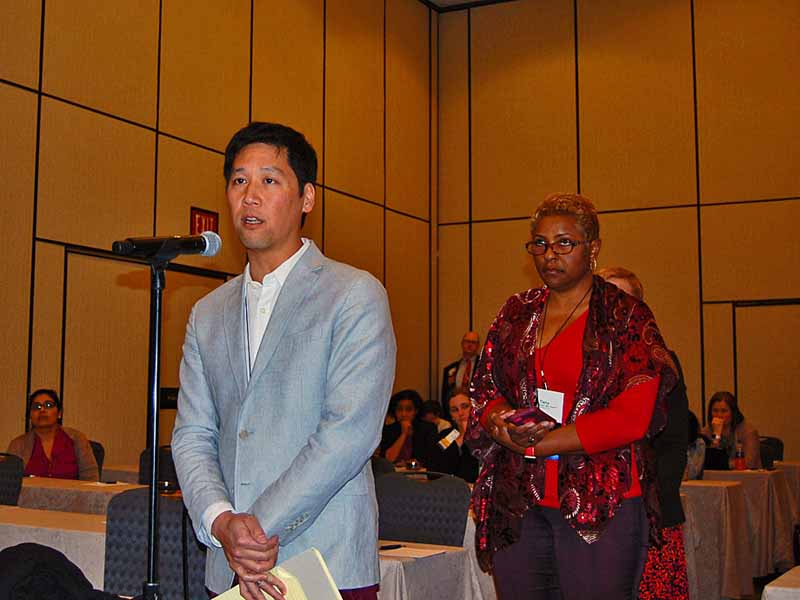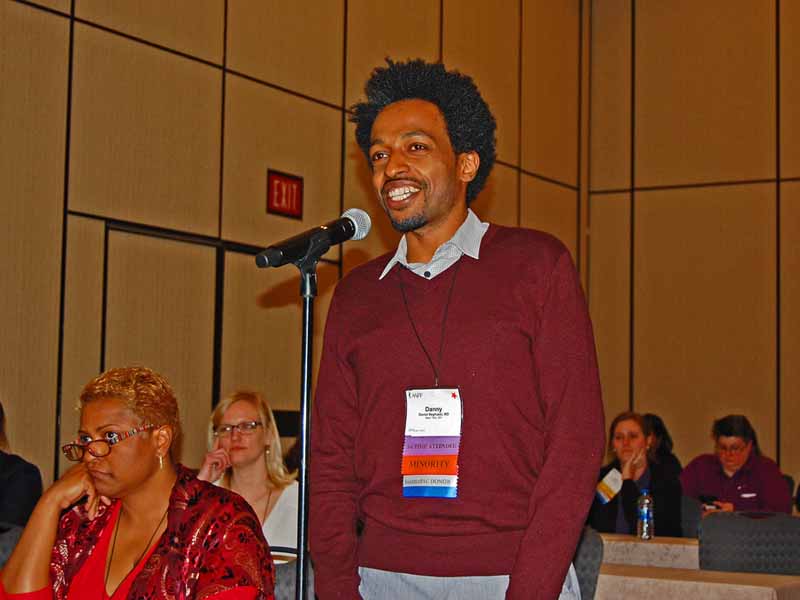NCCL Delegates Tackle Wide Range of Advocacy Issues
May 02, 2018 11:43 am David Mitchell Kansas City, Mo. – Delegates to the AAFP's National Conference of Constituency Leaders held here April 26-28 adopted resolutions aimed to protect family physicians and their patients on a wide range of issues.
Members from the five constituency groups -- women; minorities; new physicians; international medical graduates (IMGs); and lesbian, gay, bisexual and transgender (LGBT) physicians and those who support LGBT issues -- acted on resolutions that were considered April 27 by the Reference Committee on Advocacy.
Their work included adoption of a substitute resolution that calls for the AAFP to advocate for research and data collection regarding intimate partner violence related to maternal mortality.
Mary Harrel, M.D., a women's constituency delegate from Tucson, Ariz., said such data is needed to develop policies that protect pregnant women.

Brent Sugimoto, M.D., M.P.H., from Richmond, Calif., a delegate for the lesbian, gay, bisexual and transgender constituency, testifies during the Reference Committee on Advocacy.
The CDC doesn't include it as a cause of maternal death," Harrel testified during the reference committee. "A woman who is murdered during pregnancy by her intimate partner may be listed with hemorrhage under cause of death and not specifically under intimate partner violence related to a gunshot wound or stab wound that led to that hemorrhage."
HIV Status Nondisclosure
Another resolution delegates adopted calls for the AAFP to adopt policy recommending the decriminalization of the nondisclosure of HIV status and the repeal or reform of such laws, which exist in half the states.
Tisha Boston, M.D., a minority delegate from Blythewood, S.C., said advances in medicine have effectively made HIV "a chronic medical disease" that can be managed, and she questioned why patients with HIV are treated differently than others.
Cathleen London, M.D., a women's delegate from Milbridge, Maine, agreed, calling such laws "outdated and discriminatory."
Story Highlights
Last year, California changed its state law, reducing nondisclosure from a felony to misdemeanor.
Brent Sugimoto, M.D., M.P.H., a delegate with the LGBT constituency from Richmond, Calif., said such laws were passed during a time when physicians lacked the tools to fight HIV. He added that the laws not only failed to prevent its spread but also hampered public health efforts because they increased the stigma associated with HIV.
"I've seen so many young patients who avoided getting tested for years until they have full-blown AIDS," said Sugimoto, who added that repealing such laws would not prevent the prosecution of someone who "intentionally or maliciously tried to infect someone."
Opioid Advertising, Drug Pricing
Delegates also adopted a resolution that called for the Academy to support a bill in Congress that would ban direct-to-consumer advertising of opioids and opioid receptor agonists and to support legislation that would prohibit advertising such medications to clinicians.
Kristina Lelcu, M.D., general registrant from Brainerd, Minn., testified that the AAFP already has policy against direct-to-consumer advertising of products that have potential for addiction or abuse, and she encouraged the Academy to support the bill introduced by Rep. Rick Nolan, D-Minn.
Delegates also adopted a resolution that called for the Academy to support legislation that would prohibit pharmacy benefit managers from including clauses in their contracts that restrict pharmacists from informing patients when the out-of-pocket cost of a drug is less than the co-pay through their insurance.
David Hoelting, M.D., an LGBT delegate from Pender, Neb., said several states have passed legislation prohibiting this practice, and bills have been introduced in Congress that would prohibit the practice for policies obtained through Medicare and the Patient Protection and Affordable Care Act marketplace. Hoelting said the practice harms the poor and increases the likelihood that patients will skip doses of their medications.

Daniel Neghassi, M.D., minority delegate from New York, N.Y., testifies during the Reference Committee on Advocacy.
The same resolution asked the AAFP to develop a toolkit that would improve communication between pharmacists and physicians regarding pricing.
Addressing Racism
Delegates also amended and adopted a substitute resolution aimed at addressing racism in medicine.
Daniel Neghassi, M.D., a minority delegate from New York, N.Y., testified that many health systems segregate patients by race when they send privately insured people to one clinic or hospital, and patients with Medicare, Medicaid or no insurance elsewhere. He said the practice results in unequal care for patients and unequal pay for physicians who provide the same services.
"We wonder why there are health care disparities," he said. "A large reason is that our health care system is racist."
The resolution called for the Academy to adopt a policy opposing segregation of patient care, to advocate for equal payment for health care services regardless of insurance status of the patient and regardless of practice type, and to advocate for policies that require hospitals to track and report quality metrics by patients' race and insurance status, and advocate for policies that impose penalties for discrimination in medicine.
The resolution also called for the AAFP's Center for Diversity and Health Equity to develop materials and provide education to increase awareness of the problem.
Reproductive Issues
Delegates also adopted four resolutions related to reproductive health issues. One asked the AAFP to lobby to overturn the Risk Evaluation and Mitigation Strategy (REMS) required for prescribing mifepristone because it is not evidence-based and restricts access to care.
Martha Simmons, M.D., a general registrant from New York, said mifepristone has several uses that are not related to pregnancy termination, including treatment of gynecologic conditions, cancer and Cushing's disease, and she said the REMS limits physicians' ability to prescribe the drug for other indications.
Delegates also adopted a resolution opposing the criminalization of self-induced abortion. Anita Ravi, M.D., M.P.H., M.S.H.P., a general registrant from New York, said during the reference committee that physicians should not be forced to determine whether a woman sought care for a self-induced abortion or had suffered a miscarriage.
"We should be able to provide safe care for anyone who walks in the door," she said.
Other Issues
Delegates also adopted several other resolutions or substitute resolutions from the reference committee, including resolutions that call for the Academy to
- develop policy that supports equitable pay for female and minority family physicians and to advocate for related legislation;
- support the creation of physician unions "through a platform or campaign" and work to build support for such a movement with other physician organizations;
- oppose two bills in Congress that may allow discrimination in adoption;
- support legislation that limits federal funding to crisis pregnancy centers, requires them to disclose whether they have licensed medical staff, and to inform consumers if they do not provide or refer for contraception or abortion services;
- oppose the use of "fetal personhood" language in policies and legislation, and to develop materials to help members oppose such language; and
- support laws meant to prevent gun violence by allowing police or family members to petition state courts for the temporary removal of firearms from a person who presents a danger to themselves or others, and to develop or collect and disseminate education on existing laws meant to prevent gun violence.
Related AAFP News Coverage
2018 NCCL
Delegates Focus on Sexual Education, Preventing STIs
(5/2/2018)
2018 NCCL
FPs Ask AAFP to Empower Physicians, Protect Patients
(5/1/2018)
2018 NCCL Delegates Elect New Leaders
(4/28/2018)
2018 NCCL
Blackwelder: FPs, Go Out and Make the Case for Family Medicine
(4/27/2018)
2018 ACLF/NCCL
Pre-conference Workshop Aims to Advance Health Equity
(4/27/2018)